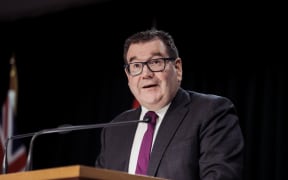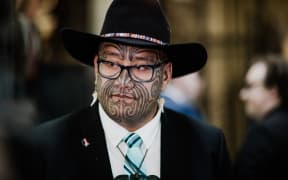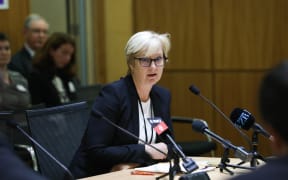By Peter Wilson*
Analysis - For a government that's acutely aware of political risk the action it took to curb public service pay was a bewildering aberration.
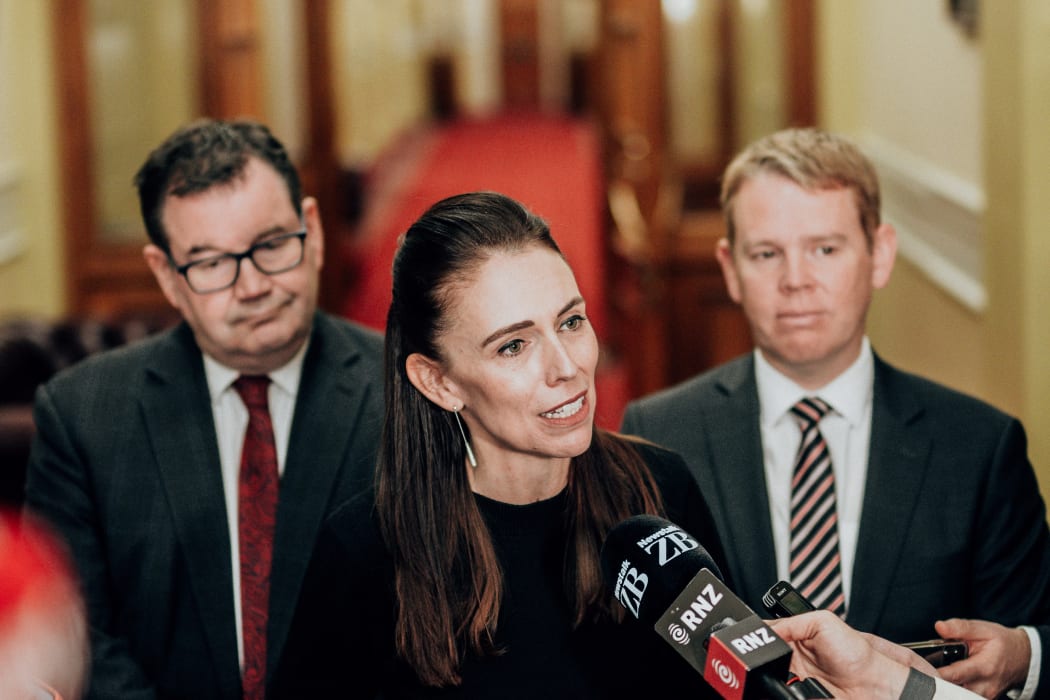
Jacinda Ardern flanked by Grant Robertson, left, and Chris Hipkins, right. Photo: RNZ / Dom Thomas
"I can't make any sense of it," said Herald columnist Shane Te Pou, a former Labour Party activist. "How can the modest fiscal savings involved possibly offset the obvious political cost of inflicting an effective pay cut on tens of thousands of frontline workers who, after all, comprise a significant chunk of Labour's base?"
That was typical of the reaction at the beginning of this week to last Wednesday's announcement. The criticism became a torrent until the government met unions and, as Stuff reported, hit the reset button.
As announced, public service workers earning more than $100,000 a year could expect no pay rise until at least 2024. For those earning over $60,000 it would be a freeze unless there were exceptional circumstances. For the 25 per cent earning below $60,000 it would be business as usual.
Ministers said the amount that would be saved couldn't be estimated because pay negotiations were still to be held.
The government appeared to have vastly under-estimated the response it was going to get, and its first go at damage control was to blame the media for running "pay freeze" headlines. Ministers said that was incorrect because staff such as nurses and teachers would continue to move through their pay scales.
It then emphasised its "focus" on reducing pay inequality, adding it to the need for fiscal prudence in times of high public debt.
Unions weren't buying that. "Don't expect us to take this lying down," said CTU president Richard Wagstaff. The PSA sent an open letter to Public Service Minister Chris Hipkins telling him "your pay restrictions at this time are unacceptable".
Doctors, nurses and teachers weighed in, and Police Association president Chris Cahill accused the government of ignoring the reality of the circumstances "loyal Kiwi workers" faced as they grappled with record house prices and out-of-control rent.
Then came the reset. After meetings with the CTU and the PSA the government softened its stance. It agreed to review its directive next year and leave cost of living increases on the table.
Hipkins denied it was a shift in position. "Cost of living increases are in scope to be discussed during negotiations, as they always are," he said.
The minister never acknowledged that point when the announcement was first made, despite being directly asked about it, RNZ reported.
When the announcement was made, Stuff reported: "The ministers said they had not made allowances for normal inflationary pressure and living cost increases because prior to Covid-19 public sector pay had outpaced inflation and private sector pay."
After the meetings Wagstaff said the government had agreed that bargaining would be held in good faith without any pre-determined outcomes. "We've got what we want," he told RNZ.
As the dust began to settle on Thursday Finance Minister Grant Robertson explained the government's latest attitude on the situation.
"I understand this has caused distress and upset," he said. "I obviously regret that deeply, but we are not talking about a pay freeze here, we are talking about a process or guidelines for negotiation."
The announcement had been "public sector pay guidance" for chief executives when they went into negotiations, a starting point.
The government wanted to lift the pay of those earning $60,000 or less, "adjust" the pay of people earning between $60,000 and $100,000 and put a hold on increases for those earning more than $100,000.
"Our desire (is) to get a focus on reducing inequality and lifting the lowest pay," he said.
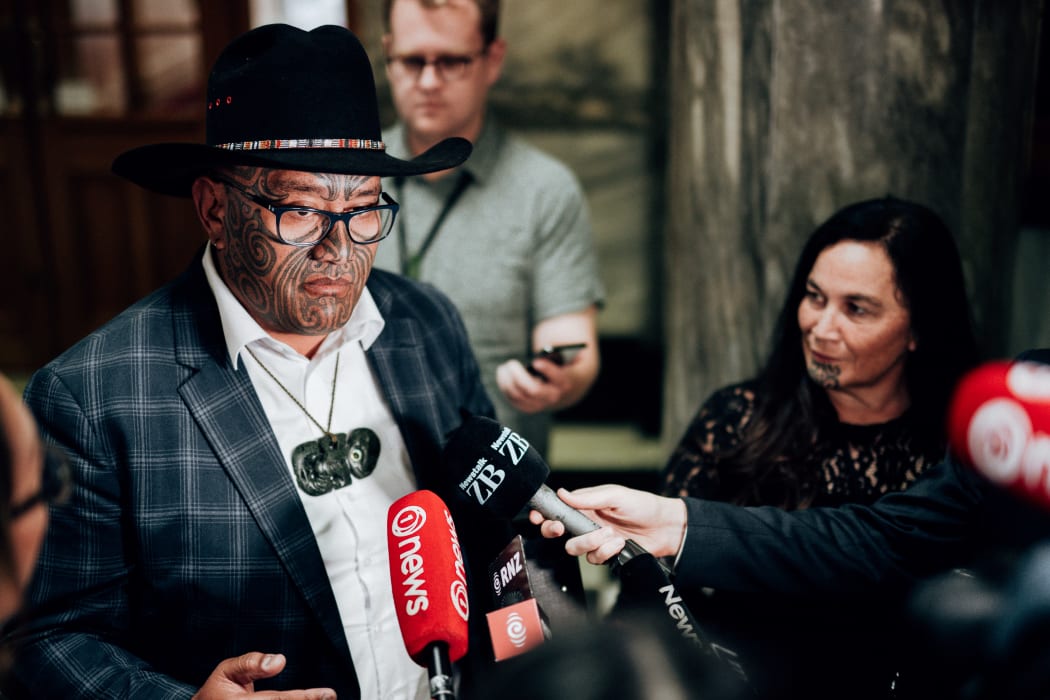
Māori Party co-leader Rawiri Waititi was ordered out of House for doing a haka in protest at questions by the Opposition about race-based policy. Photo: RNZ / Dom Thomas
In Parliament the lid blew off the race relations debate. National's Judith Collins continued to demand answers from the government for what she calls its "separatist agenda" outlined in the He Puapua report, and Maori Party co-leader Rawiri Waititi decided enough was enough.
He accused Collins of using Parliament as a forum for "bashing Maori" and performed an impassioned haka on the floor of the debating chamber before walking out with co-leader Debbie Ngarewa-Packer.
As they left Speaker Trevor Mallard ordered Waititi out for breaching the rules.
Waititi explained why he had done what he did on Morning Report the next day.
"It's been accumulating over the last couple of weeks," he said.
"It's hard to explain unless you are Maori and you can feel this barrage of racist rhetoric towards Maori.
"It's not just the He Puapua report, it's around Maori wards, it's around the Maori Health Authority, and all of these kaupapa which are equitable for Maori."
Waititi said "a whole lot of racists" were being incited to come out on social media with "absolute venom" and his party wasn't going to stand for it.
He said National was down in the polls and often used tangata whenua and Maori as a political football to gain popularity.
"When National talked about Maori wards being apartheid, about the Maori Health Authority being separatist and now they're talking about the He Puapua report also being apartheid and separatist - they can use words like that in Parliament, when we question them we get kicked out.
"Hence the haka yesterday because that is our way of debating issues."
During the general debate which followed Waititi's outburst in the House Labour's Kelvin Davis, who holds the Maori-Crown relations portfolio, responded to it: "Don't ever think that a party that gets 1.2 per cent of the vote actually represents the views of Maoridom," he said.
Most of his five-minute speech targeted Collins, whom he said had "pushed the big red race button" and had dived into "the politics of division".
Speaking outside Parliament, Collins said she wasn't going to stop asking questions about constitutional changes the government seemed to be working on until Prime Minister Jacinda Ardern started giving answers.
The situation prompted questions about how Parliament should debate issues which dealt with race, and whether a member could call another racist.
Speaker Mallard said MPs would be allowed to call policies racist but they couldn't call individual members racist.
In other news this week:
*The Serious Fraud Office charged six people over a donation to the Labour Party, accusing them of trying to conceal the true identity of a donor. It confirmed none of the individuals are sitting MPs or current or former Labour officials. The SFO is also investigating donations to National, the Maori Party and the NZ First Foundation. Ardern said "that sends a message to us in the political system that we should be looking at the way our regime works".
*The prime minister announced she would lead a trade and promotional delegation to Australia in early July - New Zealand's first since the pandemic hit. Trade Minister Damien O'Connor will travel to London and Brussels next month to discuss New Zealand's free trade agreements with Britain and the EU.
*Thousands of MIQ spaces will be freed up over the next 10 months and many will be used to bring in skilled and seasonal workers, the government announced. About 300 RSE workers will be allowed in every month from June with the total reaching 2400 by March next year. The horticultural sector welcomed the news.
*Immigration Minister Kris Faafoi was shouted down at a rally of unhappy migrants as he revealed he could not give them the news they wanted to hear in their bid to loosen border restrictions. The crowd came to Parliament with their grievances, accusing the government of leaving them out in the cold with families separated and suffering financial hardship.
Faafoi said he felt their pain. "We are acutely aware of the disruption this is causing, and as I have said we will continue to look at ways to adjust border settings."
*The government said it would clean up problems with emergency housing in Rotorua in response to reports of crime and unsafe conditions. Housing Minister Megan Woods said there would be direct contact with motels and social support services would be provided. RNZ has reported stories nationwide of families living in motels overrun with crime and violence.
*Peter Wilson is a life member of Parliament's press gallery, 22 years as NZPA political editor and seven as parliamentary bureau chief for NZ Newswire.
